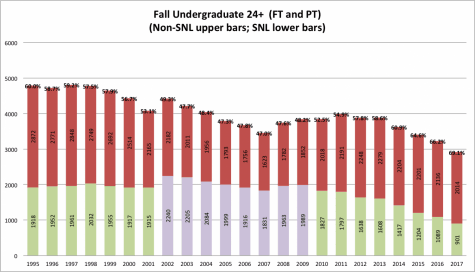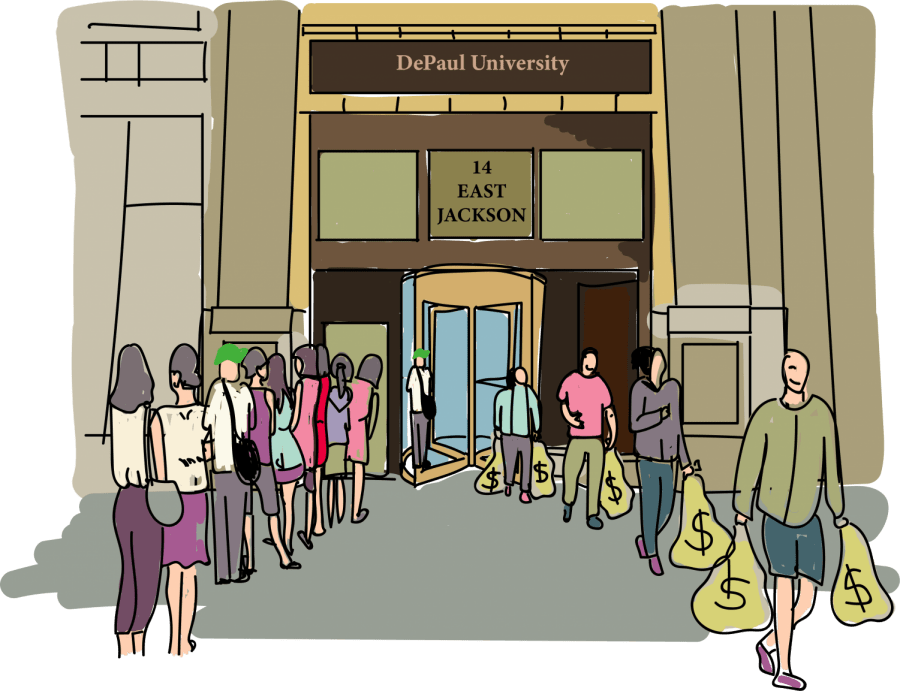Eligible faculty in the School for New Learning were offered buyouts in light of the school’s “restructuring” come fall. Of the 26 eligible faculty, more than half are accepting the buyout.
“All of the tenured-lined faculty in the School for New Learning — that includes tenured and tenured-track — were offered a voluntary buyout,” said Don Opitz, dean of SNL. “We also had six retirement-eligible full-time staff members who were also offered an early retirement incentive.”
Of the 14 tenured-line faculty who took the SNL buyout, 11 are retiring. The six staff members Opitz referenced as eligible for an early retirement incentive program is separate from the SNL buyouts, and was laid out by President A. Gabriel Esteban in an email March 8. Three of the six staff eligible for that program volunteered to take it.
SNL’s restructuring involves its renaming and rebranding as The School of Continuing and Professional Studies. The school’s current system, which is designed for adult students working full-time, offers both undergraduate and graduate programs. Nearly 70 percent of undergraduate SNL students work 30 hours or more per week, and the school’s average undergraduate age is 36. The university-wide adult student average is 26 years old.
The purpose of the shift is to give the school equal footing in relation to other continuing education programs in the Chicagoland area. Opitz said he thinks of the buyout as a positive option, stating that it gave the faculty a choice regarding how to move forward.
“The decision was made to keep the school a school, so that’s one thing that I think we often lose sight of and a sustainable footing for a long-term longevity,” he said. “The buyout is part of the school’s sustainability, so the greatest expense of any academic unit are salaries. We had a large full-time faculty and a full-time faculty that is primarily tenured faculty. There are very limited ways in which you can reduce the size of a full-time faculty, and it was thought by the administration—at least from my perspective—that offering a voluntary buyout to the faculty was a way of moving forward that would give faculty options.”
Ludovic Comeau, an associate professor staying on for the new school, said that he was originally shocked by the option of a buyout.

This graph shows the enrollment of students of the age 24 and older. The red is the university as a whole, and green and purple are SNL enrollment only. The enrollment for both the university and SNL as a whole has been on a steady decline since 2011.
“Like many of my SNL colleagues, my initial reaction was a bit emotional—a feeling of sadness that profound changes in the national adult education environment have brought the university to the point of seeking a reduction in the overall
seeking a reduction in the overall number of SNL full-time faculty and staff members,” Comeau said.
Opitz said that reducing the number of SNL faculty was not the goal of the buyout.
“It wasn’t intended to be part of a process with the final outcome being termination of the faculty, but it was really providing faculty an option to leave if they want to or retire if they wanted to,” he said.
Opitz added that he declined to take a buyout due to his optimism about the school’s future.
“What prompted that strategy was a sense that there needed to be change in the school and the change was part of a broad set of strategies,” he said. “One is to refocus the emphasis on the programs of the school so that they would align more closely with programs that are more popular in the market. [Another change is] to do more in the space of continuing education, so we’re talking certificates, stackable credentials, non-credit based offerings.”
Others in SNL are optimistic about the changes, believing them to be a gradual progression.
“To be true, the change train at SNL has been going on for two or three years,” Comeau said. “The School of Continuing and Professional Studies is the outcome of a process of curricular innovations that has unfolded throughout that period.”
SNL enrolled 722 adult undergraduate students in Fall 2018, which is fewer than the 901 undergraduate students who enrolled in Fall 2018. The school’s enrollment has been declining since 2009, which follows in trend with the rest of the university’s adult student enrollment statistics.
Though Opitz said he believes the buyout will move SNL in a positive new direction, the futures of adjunct faculty are less clear.
“I have not been told yes or no either way,” said Jim Caffey, an adjunct professor based in Missouri, in regard to what his position will be in the new SNL. “My future is unknown.”
While attempting to get in contact with the staff and faculty members of SNL, a source from the school told The DePaulia that staff members were warned about being potentially interviewed and cautioned about speaking with The DePaulia.
But Opitz said he holds the school’s adjunct faculty in high regard and believes them to be essential to the school’s continued success.
“One other thing to bear in mind is that the school’s success over the last 47 years has relied upon not just a community of full-time staff and a full-time faculty, but totally dependent upon the contributions of the part-time adjunct faculty,” Opitz said. “[…] I’m not worried about the fact that we have fewer full-time faculty; I would get really worried if we had fewer adjunct faculty.”



Keith Bell / May 5, 2020 at 2:42 pm
I would hope that DePaul would realize the value of this school. Reading this article now in May of 2020 during the COVID-19 pandemic we are reminded of the value of distance learning options. There is a real value and difference between a school fully prepared and immersed in this type of education and one quickly forced to transition to it. My education and degree and from DePaul was a world class experience and one I would recommend to anyone.
DePaul would be short sighted to limit the capabilities of this program due to short term fluctuations in enrollment. They should have been doubling down on technology and ways to continue to be at the forefront of leading in this arena. Today’s world can change in the blink of an eye as we are now sadly reminded. To think the world will go back to the old way of doing things is short sighted at best. I wish DePaul and my school the best and hope it realizes that embracing technology and distance learning is right direction for the future.
Christopher Valentine / Jun 4, 2019 at 5:43 am
So does this mean fewer degree completion options or are the options going to be more specific? I agree with offering non-degree programs, but those must offer real value to people looking for career advancement. Adult students have a much different need for applied and practical skill learning than do traditional students. I really hope DePaul gets the course offerings and delivery framework right.